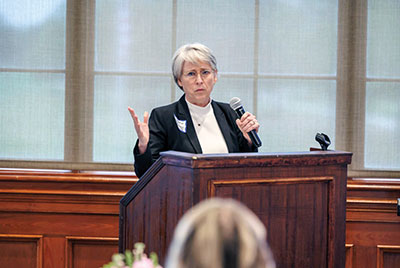The APA Foundation (APAF) officially launched its new “
Where We Play” initiative in Baton Rouge, La., last November in response to growing calls from U.S. Surgeon General Vivek Murthy, M.D., for more concerted action to combat the mental health crisis among youth and young adults. “Where We Play” encourages artists, athletes, entertainers, and their followers to see sports figures and performing artists as human beings who can excel in their chosen field while also taking care of their mental health needs. The Baton Rouge program is just the first of a series that will be held throughout the country.
APAF collaborated with APA member Kathleen Crapanzano, M.D., M.A.C.M., a professor of psychiatry and director of the psychiatry residency program at LSU School of Medicine in Baton Rouge, and partnered with
Athletes for Hope (AFH). AFH is a nonprofit founded by world-class professional athletes who strive to make a social impact at the intersection of sports and philanthropy.
To hear firsthand from athletes about their mental health needs and to spread the message that mental health care works, APAF brought together current and former collegiate athletes, coaches, physicians, health care administrators, state and local policymakers, and community leaders.
Also attending were Louisiana state Sen. Cleo Fields; former Louisiana Health Department Secretary Courtney N. Phillps, Ph.D.; former Louisiana Department of Environment Quality Secretary and former NFL player Chuck Carr Brown, Ph.D.; and Women’s Hospital CEO Emeritus Teri G. Fontenot. Topics of discussion included burnout, performance anxiety, and the effects of social media. The task of balancing high-demand athletics while attending college full time is a serious time commitment that may negatively impact a student athlete’s mental health.
APAF Executive Director Rawle Andrews Jr., Esq., introduced the APAF’s
“Mental Health Care Works” campaign to the attendees, whose goal is to help change the culture around seeking treatment for mental illness and substance use disorders. He encouraged student athletes to take the first step in seeking help for mental health concerns before they interfere with other aspects of their lives.
In her keynote address, Crapanzano remarked: “Our society should support access to mental health care and develop policies that support mental health for all people. For college athletes in particular, addressing mental health concerns as early as possible will lead to better outcomes and help them achieve their professional goals.”
AFH ambassadors included Ali Newland, an LSU softball player; Deja Griffin, a soccer player for Southern University; Katie Dickens, a professional beach volleyball player, coach, and former player at LSU; and Janice Miller, a mental health advocate and the mother of Arlana Miller, a former Southern University cheerleader who died by suicide in May 2022.
During the event, student athlete Deja Griffin shared her story of recovering from an injury as a college athlete. As a freshman at Southern University, Griffin was injured and unable to play soccer for the next two seasons. Not only did she struggle to maintain her mental health in the aftermath of her injury, she considered dropping out of school, which meant the loss of structure provided by teammates, practices, and games to motivate her.
Jaleel Green, M.D., a second-year psychiatry resident at Louisiana State University and former college football player, offered the following advice to student athletes: “The one message they should take away is that they should begin to develop a sense of identity outside of their respective sport. Whether their athletic career is over after college or they play professionally, the transition to post-career is extremely difficult without having an identity outside of the sport.”

